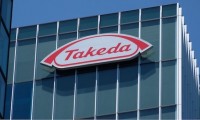-
FDA Approves Takeda’s Treatment for Rare Blood Clotting Disorder
- Source: drugdu
- 100
- November 13, 2023
-
Takeda announces EC approval for Adcetris combination in Hodgkin lymphoma
- Source: https://www.pmlive.com/pharma_news/takeda_announces_ec_approval_for_adcetris_combination_in_hodgkin_lymphoma_1502265
- 114
- October 21, 2023
-
WHO experts recommend the use of Takeda’s dengue vaccine QDENGA
- Source: drugdu
- 118
- October 10, 2023
-
Takeda to Pull Lung Cancer Drug from Market After Failed Confirmatory Study
- Source: drugdu
- 197
- October 10, 2023
-
Roche scores—again—in hemophilia drug patent case against Takeda
- Source: drugdu
- 188
- October 1, 2023
-
Takeda settles antitrust lawsuit over gout drug Colcrys after trial kicked off
- Source: drugdu
- 204
- September 25, 2023
-
Amid shortage, FDA clears several generics of Takeda’s popular ADHD drug Vyvanse
- Source: drugdu
- 126
- September 1, 2023
-
With Takeda and Hutchmed hot on the trail, Taiho wins FDA nod for stronger Lonsurf regimen in colorectal cancer
- Source: drugdu
- 132
- August 4, 2023
-
Takeda Withdraws Dengue Vaccine Application After FDA Request for More Data
- Source: drugdu
- 122
- July 14, 2023
-
Takeda and F-star announce immunotherapy partnership worth over $1bn
- Source: drugdu
- 108
- July 10, 2023
your submission has already been received.
OK
Subscribe
Please enter a valid Email address!
Submit
The most relevant industry news & insight will be sent to you every two weeks.













